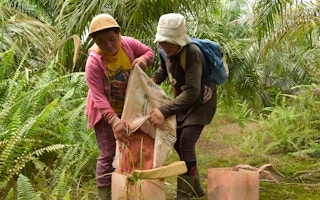Indonesia’s ban on the export of palm oil in a bid to bring down domestic cooking oil prices could prove counterproductive, warn analysts and industry representatives.
Indonesia is the world’s biggest producer and exporter of palm oil. In 2021, it produced 46.2 million tonnes of the commodity accounting for over 60 per cent of the global supply. Malaysia ranks second accounting for 25 per cent. Mainly used as cooking oil, palm oil is also used as an ingredient in cosmetics and common household items such as soaps and detergents, and as biofuels.
The Indonesian export ban on palm oil comes in as the world grapples with high cooking oil prices with the loss of sunflower oils following the conflict in Ukraine. The ban, effective from April 28, aims to bring local cooking oil prices to 14,000 rupiahs (US$0.97) a litre. In Jakarta, bulk cooking oil is currently being sold at 19,000—20,000 rupiahs (US$1.31–1.38) per litre.
Indonesian President Joko Widodo said in a statement that making cooking oil affordable (locally) was more important than dollar revenues. “Once domestic needs have been met, of course, I will lift the export ban because I know the country needs taxes… foreign exchange… a trade balance surplus, but meeting the people’s basic needs is a more important priority.”
However, the decision will hurt small farmers, says Rusli Abdullah, an economist with the Jakarta-based think tank Institute for Development of Economics and Finance. Already the prices of the fruit bunches have fallen by 50 per cent ahead of the Muslim festival of Eid al-Fitr that falls on 3 May.
Rusli was critical of the “fickleness” of Indonesia’s export ban seen as an “immature policy” that “ignores existing data”. On April 26, Indonesia had announced that the ban would only cover refined, bleached and deodorised palm olein only to amend that the next day to cover other products as well.
Previous attempts at taming domestic prices had also failed, Rusli emphasised. Early January, when local cooking oil prices soared, the government chose to subsidise packaged cooking oil, although most Indonesians prefer to buy cooking oil in bulk.
It was only at the end of January that the subsidy switched to bulk cooking oil, though that too was temporary.
Rusli opined that the government should ideally have regulated subsidies based on domestic bulk cooking oil consumption and the highest retail price set by producers and getting them to ensure that bulk cooking oil reaches the community at 14,000 rupiahs per litre. “This is similar to the scheme used by Malaysia and will ensure the availability of domestic cooking oil.”
Rusli said Indonesia could be missing an opportunity to fill a global shortage of cooking oil caused by the war in Ukraine — a major producer of sunflower oil. Global commodity buyers have turned to palm oil as an alternative for the lost supply of sunflower oil. With the Indonesian export ban, other vegetable oil producing countries like Pakistan and Malaysia now stand to gain, he said.
India, as the world’s biggest importer of palm oil, is naturally concerned at the development and the government has resorted to slashing import taxes on both crude palm oil as well as processed oil. According to the Independent Commodity Intelligence Services, India buys nearly nine million tonnes of palm oil annually, mainly sourcing the commodity from Indonesia.
In February, the Indian government reduced import taxes on crude palm oil from 7.5 per cent to five per cent following up on a December 2021 order to reduce the import duty on processed palm oil to 12.5 per cent from 17.5 per cent.
Global brands highly dependent on palm oils such as those in the food industry like Nestle, Unilever and most chocolate manufacturers, and cosmetics such as L’Oreal, are expected to be impacted by the ban and could see their cost rise, and possibly passed on to consumers if the ban continues.
Meanwhile, the Indonesian palm oil association GAPKI said the industry was working with the government to ensure affordable cooking oil supplies, but urged authorities to avoid a lengthy and devastating ban on palm oil exports.
“A total ban on the export of CPO and all its derivatives, if prolonged, will have a very negative impact on not only plantation, refinery and packaging companies, but also millions of smallholders,” GAPKI said in a statement.
This article was originally published on SciDev.Net. Read the original article.

















